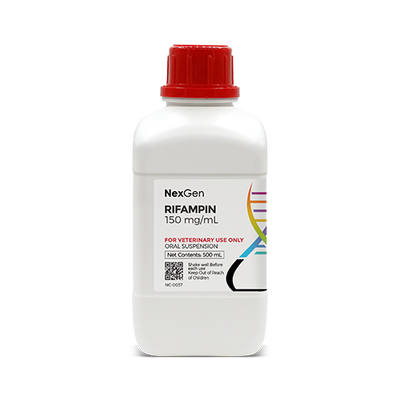
Rifampin 300 mg/mL, Oral Suspension, 250mL
Login for pricing
- Brand
- NexGen
- SKU:
- NC-0475
- Product Type:
- Suspension
- Size:
- 250ml
- Administration:
- Oral
- Therapeutic Class:
- Antibiotic
While it is not the most common cause of pneumonia in foals, Rhodococcus equi bacteria is the most serious cause of pneumonia in foals 1 to 4 months old. In the equine industry, this disease produces significant economic consequences as a result of death, extended treatment time, monitoring programs and expensive prevention strategies. Pneumonia caused by R. equi is very rare in horses older than 8 months of age.1
Rhodococcus equi bacteria are widespread in soil and are usually present to some degree in places where horses reside, but the occurrence of clinical disease varies from facility to facility. Manure from infected foals is the chief source of bacteria contaminating the environment, and foals are usually exposed to R. equi during the first week of life. R. equi infections progress slowly, with signs of disease being difficult to detect until lung lesions reach a certain point. When this occurs, foals exhibit decreased appetite, lethargy, fever, and rapid breathing. Cough may also be present, with nasal discharge being less common.
In addition to lung abscesses, intestinal and abdominal abscesses may occur in Rhodococcus equi infection. Foals with abdominal involvement often show fever, depression, loss of appetite, weight loss, colic, and diarrhea. The prognosis for foals with the abdominal form of R. equi is generally less favorable than for those with lung involvement. The bones are another even less common site of infection. If the vertebrae are affected, vertebral fracture and spinal cord compression can result. Liver and kidney abscesses have also been reported.1
A wide variety of antimicrobials are effective in vitro against R. equi. However, because of the intracellular location of R. equi and its development within pyogranulomatous lesions, drugs that are effective in vitro are not always effective in vivo.2,3 Some data indicate that the combination of penicillin and gentamicin is ineffective, however, in some countries, this combination is still used with apparent success to treat affected foals.2
Rifampin for Pneumonia in Foals
Rifampin acts by inhibiting DNA-dependent RNA polymerase in susceptible organisms thereby suppressing the initiation of chain formation for RNA synthesis. Rifampin is most active against susceptible bacteria undergoing cell division. Rifampin is reported to be active against a variety of mycobacterium species and staphylococci, Neisseria spp and Haemophilus spp.4,
Where to buy Rifampin
Rifampin is available in the U.S. through pharmaceutical manufacturers and through veterinary custom compounding companies.
FOR RX ONLY: A valid prescription from a licensed veterinarian is required for dispensing this medication.
2Stieler A.L., et. al. Effects of clarithromycin, azithromycin and rifampicin on terbutaline-induced sweating in foals. Equine Vet J. 2017 Sep;49(5):624-628.
3Giguère S, et. al. Retrospective comparison of azithromycin, clarithromycin, and erythromycin for the treatment of foals with Rhodococcus equi pneumonia. J Vet Intern Med. 2004 Jul-Aug;18(4):568-73.
4Sweeney C.R., et. al. Rhodococcus equi pneumonia in 48 foals: Response to antimicrobial therapy. Vet Microbiol 14:326-329, 1987.




















